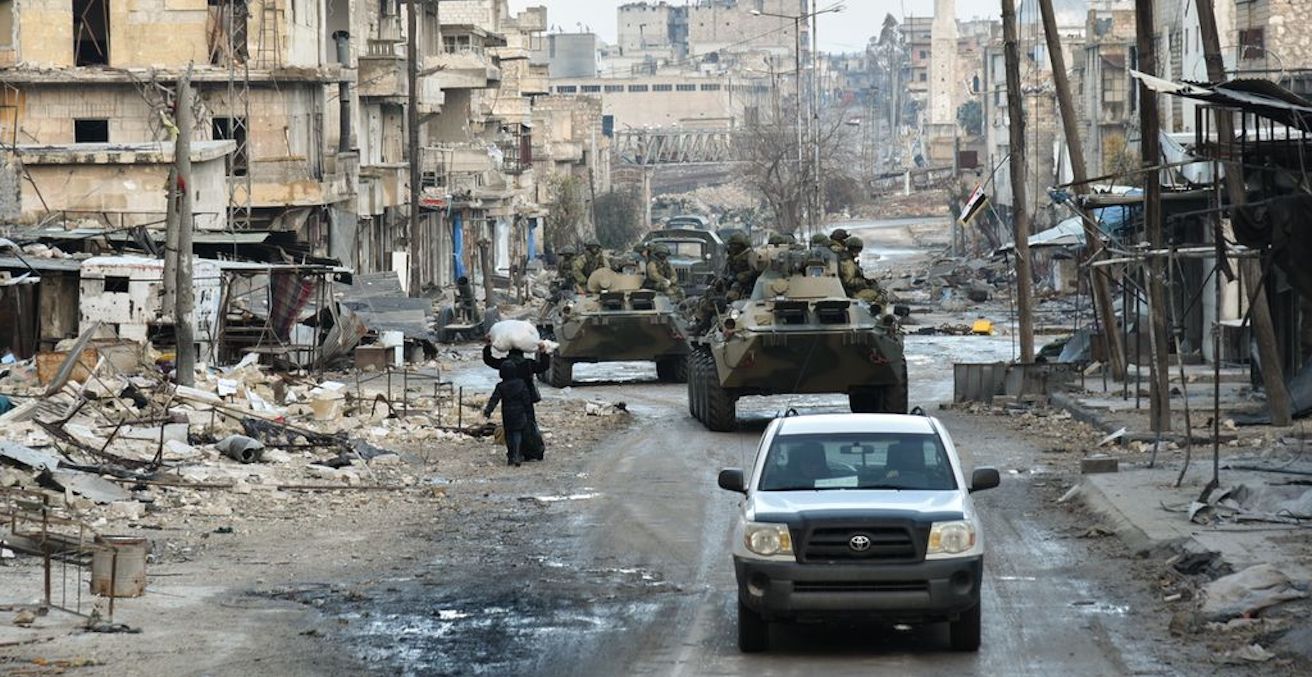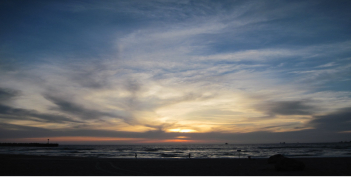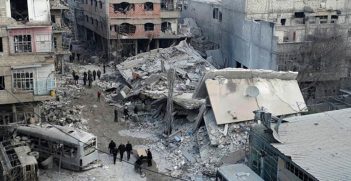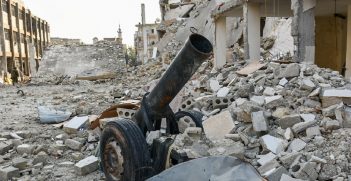Syria: The Dawn of an Insurgency

Last weekend, the United States, France and the United Kingdom bombed Syria in response to the regime’s most recent chemical weapons attack. With the civil war far from over, the opposition could learn from Lenin.
The Syrian regime of Bashar al-Assad continues its victorious path to regain power. The recent alleged gas attack against the remaining pockets of the Syrian opposition in the Damascus suburb of Eastern Ghouta was the final straw. The 8,000 fighters and their families have been transferred to Idlib Province in the north, one of two remaining rebel-held territories in Syria.
Meanwhile US President Trump finally struck in anti-dramatic fashion with France and Britain. The strike of 14 April, aimed at a few chemical weapons installations, telegraphed to al-Assad and his Russian and Iranian supporters that regime change is far from their thoughts. The West is all bluster.
In the absence of a policy or strategy on Syria, any strike is like sending darts into Jell-O. The Western coalition is prepared to send legions of ships and planes to support its supposed ethical position while it watches as hundreds and thousands of Arabs have been dying at the hands of Assad’s foreign and domestic thugs. The conflict in Syria can be interpreted in many ways but in one way it is a racist war on Arabs, whether they are Muslim or not.
The hard reality of defeat should provide an opportunity for the commanders of the Free Syrian Army and the political wings of the Syrian opposition to reflect on how this has happened. There are a number of main lessons to be gleaned from seven years of conflict.
Lesson one
As it became clear that the West did not intend on offering any effective military assistance, the resistance to the regime took a religious turn and became highly Islamicised. This turned out to be a big mistake and did great damage to the ability of the opposition to enlarge its support among Christians, Alawites and other minority groups. It offered sceptics an opportunity to brand the Syrian opposition as an offset of Islamic State (IS).
Lesson two
Self-reliance is the only way forward. The West has demonstrated that it is incapable of supporting allies, even those who espouse similar democratic values. The Kurds are learning that difficult lesson as they can now observe that their blood shed fighting IS for the West will not be rewarded. The Turks are helping but the opposition can count only on themselves.
Lesson three
The struggle will now move into a diplomatic phase. The opposition needs to prepare for this by making alliances with the Kurds and other minority groups and push for leverage with the Turks. This will require embracing democratic ideals, political laicity and social justice for all. The narrow Islamist-only concept of the Syrian opposition has not worked. It has provided a convenient excuse for the Russians to intervene and the West not to.
Lesson four
Key battles have been lost against almost impossible odds. The Syrian opposition has fought hard and well. The opposition now needs to widen the struggle and bring in as many allies as possible under the anti-Assad tent for the military and political insurgency ahead.
Lesson five
As there can be no surrender or compromise given the intransigence of al-Assad, a large part of the military insurgency needs to go underground and reorganise. The opposition also needs to take stock of the lessons learned and plan out a guerilla strategy. For this, it will need an organisation something along the lines that Lenin foresaw in What Is to Be Done in 1905.
The coming insurgency: who and why?
The insurgency should target the Russians. Without the Russian military and diplomatic power behind the Assad regime, it would likely fall. It does not enjoy much popular support outside the Alawite clan. The ruthlessness of the regime has created an implacable enemy in the Syrian opposition.
Russia is the strength behind the dictator but it is also its weak point. Russian support appears strong but it is fighting a far away war with few bases in the region. The lifeline leads directly to Russia. It is long; it is undefended and vulnerable. A well-led and organised guerilla campaign would target first Russian contractors, then Russian soldiers using every bit of leverage possible, establishing a trusted network of spies and informers. The goal would be to strike fear into the hearts of the foreign proxies. The Syrian opposition is fighting on its home territory for their freedom and families. Their motivation is unquestioned.
The over-stretched supply airlink to Rostov needs to be attacked. Daring will be required to organise an unexpected sea attack on Russian warships and submarines moored off the coast at their base in Latakia Province. For this, you need material, organisation and daring.
Once confronted with a vigorous and unpredictable guerilla force capable of striking anywhere, the Russians will eventually cut and run. They are no more courageous than their European brothers, who continue to wallow in a Munich-style political consciousness characterised by its hypocrisy and lack of any ethical principles.
In January 2018, the highly respected Chicago Council on Global Affairs published a revealing study of how Russian and American public opinion on Syria are alike. Although a clear majority thought that the war on terror was useful, Russian public opinion does not approve of using Russian troops to prevent regime change in Syria by more than a two to one margin. Once Russian sons and daughters return in multiple body bags, only then will the whispering become a public rumble. Propping up a Middle Eastern dictator in the name of reviving the nostalgia of the former Soviet empire has its price and the Syrian opposition needs to exact this price to the fullest.
Guerilla warfare means psychological warfare. When the night belongs to the opposition and Russians solders are afraid to leave their barracks, the insurgency will have a achieved a tangible measure of success.
Major actors
The Turks have only to be patient and bide their time. A judicious use of the military can be complemented by anything they can weasel out of the Astana Process. Rebuilding northern Syria is a long-term goal, a strategy that will more surely displace the angry Kurds. It will also prevent the Iranians from forging their bridgehead to the Mediterranean. The Gulf Arabs will back Turkey and the insurgency on this. History has always pitted Turkey against Russia. Turkish President Erdogan and the Justice and Development (AK) Party cherish their love-hate relationship with NATO and will always tilt West, not East. This is reinforced by their trading partnership with Europe. This is why the Astana Process can hardly be more than a tentative initiative. In contrast to their Astana partners on the military strikes in Syria, Turkish President Erdogan has welcomed the renewed effort by NATO.
Everyone is waiting for a coherent policy and strategy to emerge from the United States. One wonders how much longer Trump will be in the White House. The mid-term elections look awful for the Republican Party. If the McCain tribe takes over, Syria will be a first priority and all bets on Assad’s longevity are off. On Syria, the Democrats will dilly-dally and probably do nothing, not even support the insurgency.
How can the Russians control Assad? Not so easily, as they are learning. More and more Russian money, men and equipment will be required. The Russians will not rebuild Syria. They will try and police it but that is a task that planes and military hardware alone can’t achieve: it would require Russian boots on the ground.
Dr Bruce Mabley is the director of the Mackenzie-Papineau Group think tank based in Montreal and devoted to analysis of international politics. He was formerly a Canadian diplomat and served in Turkey at the beginning of the Syrian civil war.
This article is published under a Creative Commons Licence, and may be republished with attribution.





